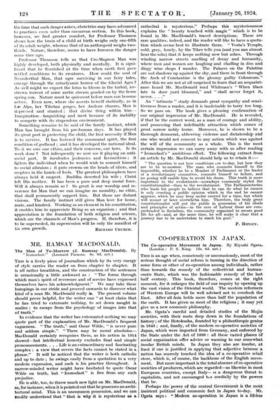MR. RAMSAY MACDONALD.
The Man of To-Morrow (J. Ramsay MacDonald). By "Iconoclast." (Leonard Parsons. 8s. 6d. net.) Tins is a lively piece of journalism which by its very energy of style carries the reader on from chapter to chapter. It is all rather breathless, and the construction of the sentences is occasionally a little awkward as : " The forms through which man's spirit of reverence and of service have expressed themselves have his acknowledgment." We may take these butnpings in our stride and proceed onwards to discover what kind of a man Mr. MacDonald really is. The present volume should prove helpful, for the writer can " at least claim that he has tried to extenuate nothing, to set down naught in malice ; to escape from the psychology of images into that of truth."
In evidence that the writer has extenuated nothing we may quote part of the explanation .of Mr. MacDonald's frequent vagueness. " The truth," said Oscar Wilde, " is never pure and seldom simple.". " There may be moral absolutes— MacDonald certainly recognizes them, as his action in 1914 showed—but intellectual honesty excludes final and simple pronouncements. . . . Life is an extraordinary and fascinating complex : a view that covers the facts cannot be stated in a phrase." It will be noticed that the writer is both catholic and up to date ; he swings easily from a quotation to a very modern expression, and such is his practice throughout. A narrow-minded writer might have. hesitated to quote Oscar Wilde on truth, but. " Iconoclast" is free from any such prejudice.
He is able, too, to throw much new light on Mr. MacDonald, as; for instance, when it is pointed out that he possesses an archi- tectural mind. This is an uncommon possession, and we can readily understand that "that is why it is mysterious as a
cathedral is mysterious." Perhaps this mysteriousness explains the " beauty touched with magic " which is to be
found in Mr. MacDonald's travel descriptions. These are rare qualities, indeed, and the, reader will like to have a quota.-
tion which seems best to illustrate them. " Vesta's Temple, cold, grey, lonely, by the Tiber tells you (and you can almost hear the sobs) that it keeps nothing now but ashes. Through winding narrow streets smelling of decay and humanity, where men and women are laughing and chaffing in dim and dingy wine shops I wander. The Palaces on the Palatine are sad shadows up against the sky, and there in front through the Arch of Constantine is the gloomy guilty Colosseum."
After this we are not at all surprised to learn that an acquaint- ance heard Mr. MacDonald read Whitman's " When lilacs late in door yard bloomed," and " shall never forget it, never. . . ."
An " intimate " study demands great sympathy and sensi- tiveness from a reader, and it is inadvisable to tarry too long.
So we pass on. The book gives a pleasing confirmation of our original impression of Mr. MacDonald. He is revealed,
if that be the correct word, as a man of courage and ability, and possessing that indefinable attraction which comes of great sorrow nobly borne. Moreover, he is shown to be a thorough democrat, abhorring violence and dictatorship and one who would not consent to any action which was against
the will of the community as a whole. This is the most certain impression we can carry away with us after reading " Iconoclast's " ambitious effort. The following extract from an article by Mr. MacDonald should help us to retain it :—
" The question is not how conditions .re to-day, but how they are to be to-morrow. The man who commits himself to the impossible, whether he be a Member of Parliament or the leader of a revolutionary committee, commits himself to failure, and no posing will enable him to avoid his doom. This truth .is more important to the evolutionist—nowadays commonly styled the constitutionalist—than to the revolutionist. The Parliamentarian who leads his people to believe that he can do what he cannot is only creating a public opinion which in the end he cannot appease, which he may keep under control for a time, but which will sooner or later overwhelm him. Therefore, the truly great constitutionalist will put the public in possession of his ideals and principles of action—in the case of Labour these are com- prehended in Socialism, the community organized to secure good life for all—and, at the same time, he will make it clear that a journey has to be undertaken to reach his goal."
P. RIPLEY.


































 Previous page
Previous page